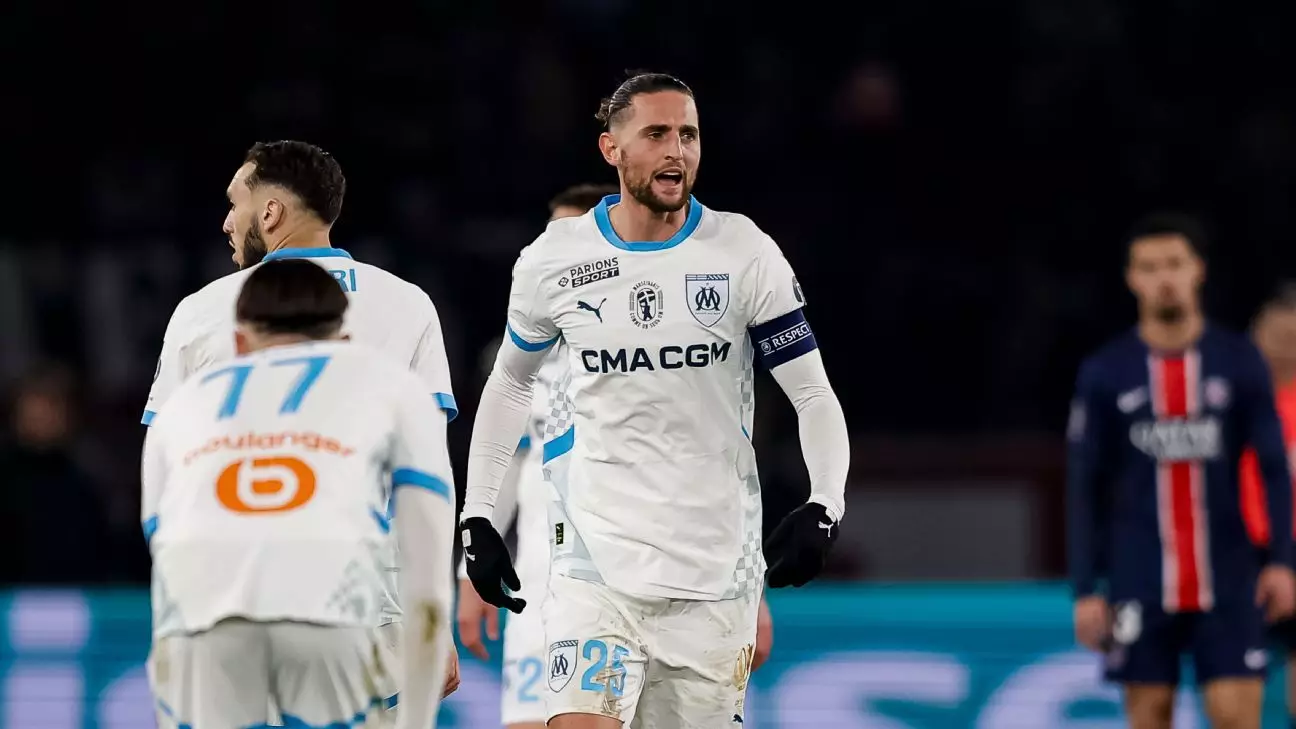The picturesque city of Marseille has often been a backdrop for fierce rivalries that span decades, but it was within the confines of the Parc des Princes during a recent match against Paris Saint-Germain that the dark underbelly of football emerged. The game ended with a score of 3-1 in favor of PSG, but the true drama unfolded in the stands and on social media, where Marseille midfielder Adrien Rabiot vocalized his outrage. “You can’t buy class,” Rabiot directed pointedly at PSG President Nasser Al-Khelaifi. His words resonated far beyond the final whistle, sparking a broader conversation about racism and homophobia in French football culture.
Rabiot’s career trajectory has been anything but conventional. After a fruitful stint at PSG, where he made over 200 appearances, the Paris-born player chose to don the colors of Marseille, much to the ire of his former club’s fans. But it was not just the loss that stung; it was the vitriolic assaults from the crowd—racist slurs and anti-gay chants aimed at him and his teammates. “You have to pay for everything one day. You won’t be taking it to heaven,” he wrote, painting a grim picture of a culture that often allows intolerance to fester unchecked in stadiums.
The Hypocrisy of Silence
A critical point of Rabiot’s statement was his lament about the double standards prevalent in the world of football. According to his mother and agent, Véronique, who intends to initiate legal action, the ineffectiveness of referees like Clément Turpin to halt games marred by discrimination is a disgrace. “Why are some matches stopped and not others?” she questioned, spotlighting a systemic failure that allows discriminatory behavior to thrive while punishing other acts fiercely.
French law is quite clear; it stipulates severe penalties, including hefty fines and potential imprisonment, for acts of public discrimination. Yet the actions of the Ligue 1 community suggest a tolerance for bigotry that seeps into the fabric of the game. Organizations like Rouge Direct are now calling for decisive governmental action, demanding that authorities impose stringent penalties on those who engage in hateful conduct. Their evidence, captured during the match, vividly illustrates the ugly chants directed at Marseille. The normalization of such behaviors highlights the reluctance to confront the issues head-on, placing corporate interests above ethical responsibilities.
Class vs. Cash: The Eternal Conflict
Upon venturing into this issue, it becomes increasingly evident that Rabiot’s assertion about class and wealth encapsulates a much larger debate. While PSG boasts a seemingly endless supply of financial resources since its acquisition by Qatar Sports Investments, this does not equate to respect or integrity—a lesson poignantly articulated by Rabiot. Sporting achievements should be celebrated, but when laced with discrimination and hostility, the veneer of success becomes tarnished.
What is deeply troubling is the frequency and regularity with which such incidents have occurred. Fans from PSG previously faced sanctions, including stadium closures, due to similar outbursts, and yet incidents persist. This raises serious questions about the accountability of clubs and their fans. What’s shocking is that the intention behind these chants may be rooted more in obscuring the truth about their own failures than in directly attacking their rivals. By using derogatory terms that allude to a city’s diverse demographic, the chants go beyond mere rivalry; they highlight a disturbing societal issue that should not be ignored.
Reflections on Accountability and Change
The incident encapsulates a moment of reflection not just for those in the stands, but for everyone who loves the sport. Rabiot may have risked alienating a segment of fans who idolize the club he once belonged to, but his principled stance against discrimination and attacks reveals the true spirit of sportsmanship. What remains to be seen is whether the football community in France, from fans to officials, is ready to evolve into one that does not tolerate hatred.
As this situation continues to unfold, those who truly cherish the game must stand united against bigotry and promote a culture of inclusivity within football. The events that transpired call for accountability and a collective refusal to accept anything less than dignity and respect for all participants. Perhaps it’s time for fans, players, and leagues to reconsider what truly defines ‘class’ and ‘success’ in the world of sport.

